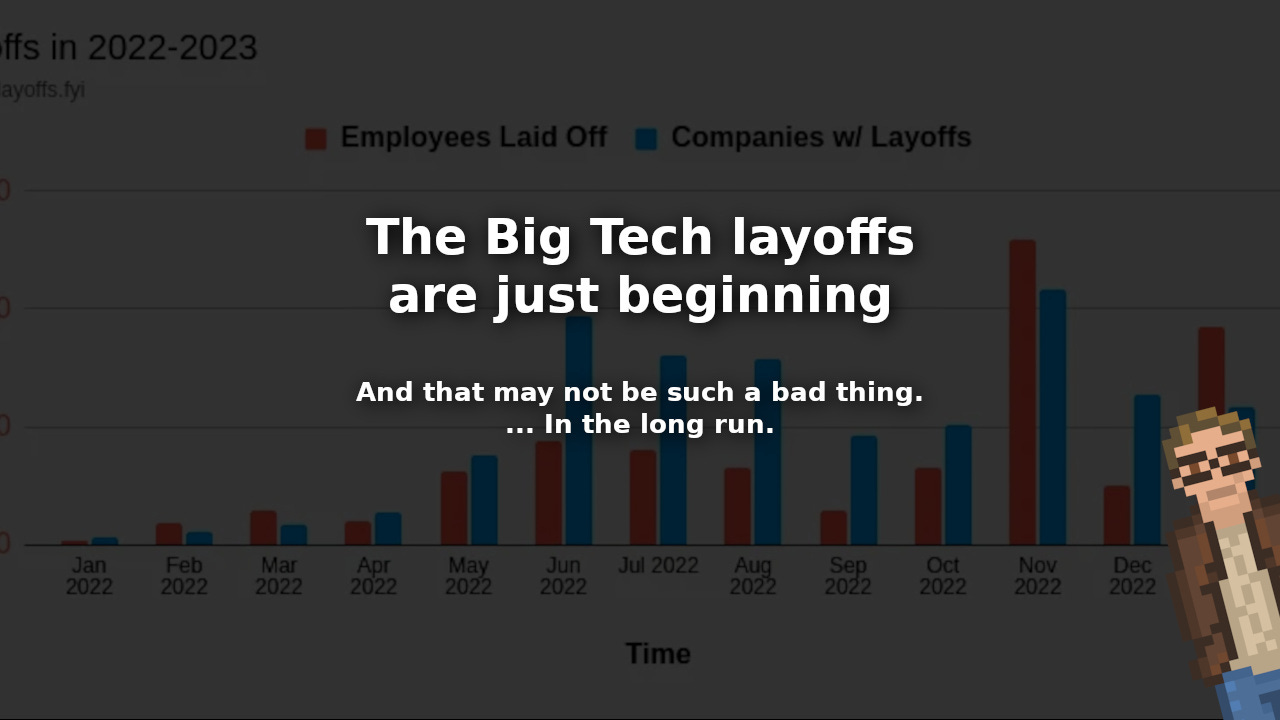The Big Tech layoffs are just beginning
(And that may not be such a bad thing... in the long run.)
Earlier today, Microsoft announced that they will be laying off roughly 10,000 full time staff — which amounts to nearly 5% of all Microsoft employees.
And this isn’t the first big layoff of the year… despite the year only being roughly 2 weeks old.
Coinbase. Amazon. Cisco. Salesforce. It seems like almost every major Tech firm is starting 2023 by announcing layoffs (or had already announced staff cuts in the final days of 2022).
According to Layoffs.fyi — which tracks tech layoffs over the course of 2022 and 2023 — there have been a total of 37,526 employees laid off, at Tech companies, so far this year. That is on top of the 154,386 laid off in 2022.
And things appear to be accelerating.
Things really kicked into gear in Q2 of 2022 — after a year and a half of lower layoff numbers — and has only grown since then. Heck. Two of the biggest months of layoffs in the last year… have been in just the last 3 months.
Now, here’s the thing: This absolutely stinks for the people losing their jobs.
Not fun. Not fun at all.
But, and this may be difficult for many to hear, this could be exactly what the Tech industry needs. And, ultimately, it may be hugely beneficial for all of us who work within it.
The Tech Companies are Bloated
Let’s just say it: most major Tech companies are wildly, insanely bloated.
You know it. I know it. Everyone who has worked in the computer industry for more than a few years knows it.
Engineering teams are over-filled with people — often poorly qualified people who do not have a passion for computers — with differing views on how to build software. Project Management has become bloated, both in terms of total staff and approach to the job. We have an almost endless number of newly created position types that have never before existed within the Tech industry.
Lunduke Journal Monthly PDF - Exclusive Videos & Books - Subscriptions
Lunduke.Locals.com - Lunduke on Twitter - Lunduke on LinkedIn
The end result is an ever expanding number of meetings, breathtaking levels of over-engineering, and productivity that is measured (increasingly) based on imaginary metrics that have no actual bearing of the development of hardware or software.
In the end: Software quality is getting worse, the rate of innovation is decreasing, and people in the Tech industry (who actually do the work) are increasingly stressed while working on increasingly large teams.
This is the core of “The Mythical Man Month”.
The basic idea of which is this: If you have a project that you want to ship faster… throwing a bunch of people at it will, at some point, actually slow down progress and add delays.
Case in point: Twitter.
Leave all political-related thoughts off to the side for a moment. Let’s focus purely on the staffing aspect.
Consider that Twitter has cut roughly 50% of its workforce… and, since that happened:
The service has continued to function.
The rate of new feature changes (for better or worse) has visibly increased.
The total traffic to the service has increased.
All of that has been accomplished with half the staff that it had just a few short months earlier.
This makes Twitter a simple, clear case-study on the over-bloated-ness of some Tech companies… and shows that reductions in staff (even dramatic reductions) can result in increased profitability and (potentially) increased ability to ship new features.
This lesson is not lost on the CEOs, investors, and Boards of the Big Tech companies out there. We are only beginning to see the wave of layoffs because of this. It will, undoubtedly, continue well into 2023. Whether we want it to or not.
But, in the end, these companies could be left not only more profitable… but better places to work, producing better software and hardware.
We Need More Small Tech Companies
This also means that there are going to be a lot of Programmers, Designers, Testers, SysAdmins, and others who will be finding themselves out of work and trying to decide what their next adventure will be.
Some of them will decide to follow in the footsteps of their 1970s and 1980s brothers… and start their own software or hardware company. Maybe even in a garage somewhere.
Some of those companies… will fail.
But not all.
And I’m going to say this clearly: The computer industry is in dire need of fresh blood.
New companies. Small companies. Companies willing to try something new, different, and awesome.
And it wouldn’t hurt us if some of those are companies who are not interested in becoming the next Billion Dollar Mega Corporation… but who are content to cater to a niche market.
This could not only provide us with a healthier, more innovative, more fun computer industry… but it could also give us a larger number of fun, small companies to work for.
You know.
For all those folks that just got laid off from that big, soul-less, Mega Corporation and would like to get back to the roots of the computer industry.
In the end… not so bad.
This period of time will, without a doubt, be difficult for many. But, in the end, everyone could be far better off. The Big Tech firms, and the small. And, most importantly, the individual nerds that work at them.
Lunduke Journal Monthly PDF - Exclusive Videos & Books - Subscriptions
Some other Premium Lunduke Journal Articles you might enjoy:
Lunduke.Locals.com - Lunduke on Twitter - Lunduke on LinkedIn




